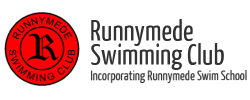
SwimAbility
If you are a swimmer with a disability who has not considered taking part in competitive swimming, why not start now?
Swimming is also a great way to have fun, keep fit and learn new skills!
We provide an inclusive environment for swimmers with disabilities to train alongside the mainstream squads and take part in the club’s social activities. We also offer competitive opportunities and provide information and support on swimming competitively at disability galas/para-swimming.
Runnymede Swimming Club has wheelchair access to the pool, as well as accessible parking and accessible changing room facilities. Runnymede Swimming Pool also has a hoist for entry and exit, in and out of the pool, if required. If you would like further information, advice or support regarding disability swimming from the Runnymede Swimming Club, please contact us by sending an email to: disability@runnymedeswimmingclub.com
Training Times
Sessions below depend on Groups. Please speak to your Swimability coach if you are not sure which session(s) to attend.
Group 1 Swimmers : £29.00 per month
Group 2 Swimmers : £35.00 per month
Group 3 Swimmers : £42.00 per month
| Mon | Tues | Weds | Thurs | Fri | Sat | Sun | |
|---|---|---|---|---|---|---|---|
| a.m. | 5:30-7:00
(Invite only) |
||||||
| p.m. | 6:00-7:00
|
7:00-8:00 Training Pool
8:00-9:00 (Invite only)
|
12:00-1:00
Training 1 1:00-2:00 Training 2 12:00-2:00 Competition 1 |
All swimmers of the SwimAbility Squads take part in disability galas around the region and throughout England. In addition, SwimAbility Squad members compete in mainstream galas where appropriate to their times.
For swimmers with learning disabilities, we are affiliated with Special Olympics Essex. This provides more opportunities to take part in Special Olympics galas around the country and internationally. Special Olympics Essex is part of the Special Olympics GB and worldwide organisation. If you would like more information about Special Olympics, email: specialolympics@runnymedeswimmingclub.com
Policies
Runnymede Swimming Club operates in accordance with the ASA Child Protection and Equal Opportunities Policies. It also operates a Code of Conduct for all its members and personnel.
Para Swimming Classification
Classification is the grouping of swimmers with like ability to ensure that there is a fair playing field. Classification is vital for those swimmers wishing to pursue a pathway in competitive swimming. Each impairment group has a different range of numbers that is summarised in the table below, each number is given a prefix. S denotes the class for Freestyle, Backstroke and Butterfly events. SB denotes the class for breaststroke events and SM denotes individual medley.
Outline of Swimming Classifications
| Category | Classification | Description |
|---|---|---|
| Physical Disability | S1/SB1/SM1 | Most Severe Physical Impairment |
| S2/SB2/SM2 | ||
| S3/SB3/SM3 | ||
| S4/SB4/SM4 | ||
| S5/SB5/SM5 | ||
| S6/SB6/SM6 | ||
| S7/SB7/SM7 | ||
| S8/SB8/SM8 | ||
| S9/SB9/SM9 | ||
| S10/SB10/SM10 | Least Severe Physical Impairment | |
| Visual Impairment | S11/SB11/SM11 | Little or no vision |
| S12/SB12/SM12 | Visual acuity of up to 2/60 and/or a visual field of less than 5 degrees | |
| S13/SB13/SM13 | Visual acuity above 2/60 up to 2/60 and/or a visual field of more than 5 degrees and less than 20 degrees | |
| Intellectual Disability | S14/SB14/SM14 | IQ of 75 or lower |
There are different processes for classification for different disability groups. Watch this video to find out how physical classifications are carried out.
Classification provides a structure for competition. Athletes competing in Paralympic sports have an impairment that leads to a competitive disadvantage in sport. Consequently, a system has to be put in place to minimise the impact of impairments on sport performance and to ensure the success of an athlete is determined by skill, fitness, power, endurance, tactical ability and mental focus. This system is called classification.
Ten eligible impairments
There are ten different types of impairments:
- Impaired muscle power
- Impaired passive range of movement
- Loss of limb or limb deficiency
- Leg-length difference
- Short stature
- Hypertonia
- Ataxia
- Athetosis
- Visual
- Intellectual